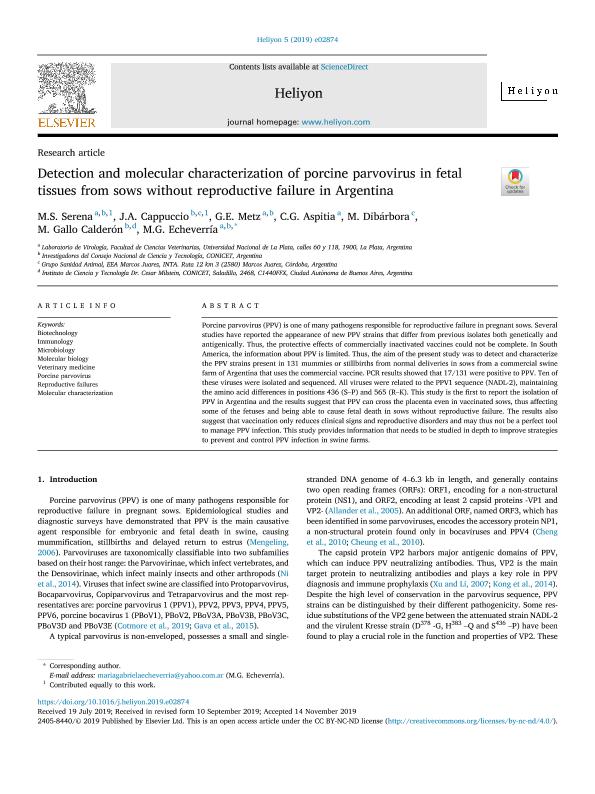Artículo
Detection and molecular characterization of porcine parvovirus in fetal tissues from sows without reproductive failure in Argentina
Serena, Maria Soledad ; Cappuccio, Javier Alejandro
; Cappuccio, Javier Alejandro ; Metz, German Ernesto
; Metz, German Ernesto ; Aspitia, Carolina Gabriela; Dibárbora, Marina
; Aspitia, Carolina Gabriela; Dibárbora, Marina ; Calderón, M. Gallo; Echeverría, M. G.
; Calderón, M. Gallo; Echeverría, M. G.
 ; Cappuccio, Javier Alejandro
; Cappuccio, Javier Alejandro ; Metz, German Ernesto
; Metz, German Ernesto ; Aspitia, Carolina Gabriela; Dibárbora, Marina
; Aspitia, Carolina Gabriela; Dibárbora, Marina ; Calderón, M. Gallo; Echeverría, M. G.
; Calderón, M. Gallo; Echeverría, M. G.
Fecha de publicación:
11/2019
Editorial:
Elsevier
Revista:
Heliyon
ISSN:
2405-8440
Idioma:
Inglés
Tipo de recurso:
Artículo publicado
Clasificación temática:
Resumen
Porcine parvovirus (PPV) is one of many pathogens responsible for reproductive failure in pregnant sows. Several studies have reported the appearance of new PPV strains that differ from previous isolates both genetically and antigenically. Thus, the protective effects of commercially inactivated vaccines could not be complete. In South America, the information about PPV is limited. Thus, the aim of the present study was to detect and characterize the PPV strains present in 131 mummies or stillbirths from normal deliveries in sows from a commercial swine farm of Argentina that uses the commercial vaccine. PCR results showed that 17/131 were positive to PPV. Ten of these viruses were isolated and sequenced. All viruses were related to the PPV1 sequence (NADL-2), maintaining the amino acid differences in positions 436 (S–P) and 565 (R–K). This study is the first to report the isolation of PPV in Argentina and the results suggest that PPV can cross the placenta even in vaccinated sows, thus affecting some of the fetuses and being able to cause fetal death in sows without reproductive failure. The results also suggest that vaccination only reduces clinical signs and reproductive disorders and may thus not be a perfect tool to manage PPV infection. This study provides information that needs to be studied in depth to improve strategies to prevent and control PPV infection in swine farms.
Archivos asociados
Licencia
Identificadores
Colecciones
Articulos(CCT - LA PLATA)
Articulos de CTRO.CIENTIFICO TECNOL.CONICET - LA PLATA
Articulos de CTRO.CIENTIFICO TECNOL.CONICET - LA PLATA
Citación
Serena, Maria Soledad; Cappuccio, Javier Alejandro; Metz, German Ernesto; Aspitia, Carolina Gabriela; Dibárbora, Marina; et al.; Detection and molecular characterization of porcine parvovirus in fetal tissues from sows without reproductive failure in Argentina; Elsevier; Heliyon; 5; 11; 11-2019; 1-6
Compartir
Altmétricas



